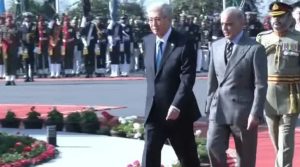ISLAMABAD – Desert Locust emerged as a serious threat to food security in Pakistan and regional countries during 2019 and 2020. The federal and provincial governments, Pakistan Armed Forces, District Administrations, farmer communities and Food and Agriculture Organization (FAO) joined hands to confront the challenge of desert locust emergency and successfully managed the situation.
In Pakistan, FAO with the support of development partners proactively collaborated with the Ministry of National Food Security and Research (MNFS&R) to facilitate the Department of Plant Protection (DPP) and other concerned institutions in managing this challenge. Under this partnership, the main focus remained on institutional strengthening and technical capacity building in Desert Locust surveillance and control operations and the creation of awareness about the potential threat of Desert Locust at the grassroots level.
For strengthening Desert Locust control capacity concerned institutions were provided with 54 Ultra Low Volume (ULV) sprayers on a fast track basis. This support has manifolds enhanced the Locust control capacity of the country. For enhancing Desert Locust surveillance capacity of the concerned institutes 100 eLocust3g devices were also provided. In addition, for the adoption of safe application of pesticides and human protection in control operation, the spraying staff was provided with 1300 Personal Protective Equipment (PPE) kits. These joint efforts have reasonably enhanced the Desert Locust surveillance and control capacity in the country. However, for institutional building and providing a sound basis for future effective implementation of desert locust control operations and ensuring food security in the country, World Bank with the technical assistance of FAO has developed a major project (costing US$ 200 million) on Locust Emergency and Food Security (LEAFS).
This project is currently being implemented by the Ministry of National Food Security and Research. It is expected that this initiative will lead to improving the Desert Locust management and food security outlook of the country. During the spread of Desert Locust, the food security and livelihood of the farmers were affected but the situation remained manageable due to timely interventions.

The Food and Agriculture Organization (FAO) of the United Nations, under the FAO-China South-South Cooperation (SSC) Programme, funded by the Government of the People’s Republic of China, handed over 10 single cabin vehicles mounted with Ultra Low Volume (ULV) sprayers to the Department of Plant Protection (DPP), Government of Pakistan. The ceremony was organized at the DPP Karachi on 14 August 2021.
The Federal Minister for National Food Security and Research Syed Fakhar Imam attended the handing over ceremony as a Chief Guest. The ceremony was virtually participated by the Commercial Minister Counsellor of the Chinese Embassy to Pakistan, Mr XieGuoxiang.
Federal Minister for National Food Security and Research, Syed Fakhar Imam thanked FAO for their tremendous support for not only providing 10 vehicles, 100 eLocust3g devices and other equipment to DPP but also for their continuous technical support throughout the years. He also extended his thanks to the Peoples Republic of China for extending enormous material support of 600,000 litres of pesticides, 70 Airblast sprayers and drones to meet the crises. He said the way the international community stood up with Pakistan is an example of great international cooperation. Many countries like the United Kingdom, the Republic of Korea and Japan came forward to help Pakistan to meet the crises. Moreover, the World Bank LEAFS Project worth US$ 200 million has come to operational to fill the gaps.

FAO Representative in Pakistan a.i., Rebekah Bell said Pakistan faced two challenges at the same time in 2020 – one was the desert locust and the other was COVID19. However, with the good partnership at the global, regional, national and provincial levels along with the support of development partners, most prominently, the government of the People’s Republic of China, the current outbreak has been controlled. This is because of the close collaboration of the partners who have worked together to build the capacity of institutions while providing technical support, she informed.
Commercial Minister Counsellor of Chinese Embassy to Pakistan, XieGuoxiang said the Government of China supports FAO-China South-South Cooperation Programme through international organizations like FAO.
Chinese Government will offer different modalities of capacity building activities for Pakistan, which involves sharing Chinese experiences on desert locust surveillance and control technologies and hands-on training for locust field officers, he informed.

Dr Muhammad Tariq Khan, Director General, Department of Plant Protection (DPP) welcomed all the participants for their presence especially Hon’able Syed Fakhar Imam, Federal Minister, MNFSR and Ms Rebekah Bell for coming all over from Islamabad to greet this occasion. He thanked the People’s Republic of China, the Republic of Korea, Japan and all other countries for their valuable support that enabled Pakistan to meet the crises. He mentioned that despite the fact that locust control is a mandate of DPP, the canvas of locust threat was much more than the available material and manpower resources in DPP then. He expressed the need for collaboration and cooperation in future as well to meet such problems.
Dr Mubarak Ahmed, Director General (Retd.) DPP also expressed his views and said that such a high level of political, technical and operational commitment among international and government functionaries is an example of great success the country has made. He stressed the need for further collaboration in all areas to ensure our food security in Pakistan.
Officials of NDMA and PDMA, researchers, high government officials and others, attended the event.














